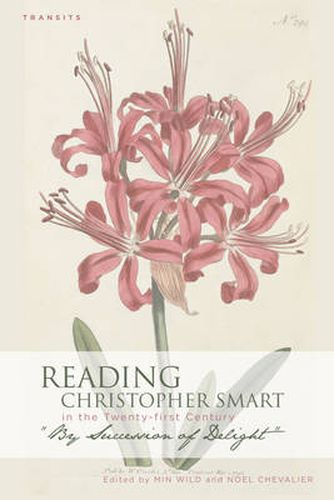Readings Newsletter
Become a Readings Member to make your shopping experience even easier.
Sign in or sign up for free!
You’re not far away from qualifying for FREE standard shipping within Australia
You’ve qualified for FREE standard shipping within Australia
The cart is loading…






Front Flap:
Poet, essayist, actor, hymn-writer, wit, magazine editor, transvestite stage performer: Christopher Smart, Georgian don-turned-writer, was all of these. He was, and remains, a mercurial individual, an idiosyncratic yet strangely familiar writer of spiritual heights and material depths. His paradoxical exuberance fascinates scholars of eighteenth-century culture, and this collection of essays, a snapshot of current scholarship from both new and established Smart scholars, offers, among others, literary, theological, dramatic and philosophical perspectives on his writing. Here are new ways of reading familiar Smart works - including the astonishing, devout poem of his incarceration, Jubilate Agno - and unfamiliar ones, such as his translations and writing for children. Unexpected readers of Smart, from Coleridge to a testy anonymous annotator, are examined, and Smart’s sacred translations and profane stage presence each find a place. Tom Keymer’s re-evaluating afterword finds the quality of betweenness in Smart’s work: between eras, between genres, between forms, Smart’s vitality demands reassessment for each new generation of readers.
Contributors: Karina Williamson, Min Wild, Rosalind Powell, Fraser Easton, Clement Hawes, William E. Levine, Noel Chevalier, Lori A. Branch, Daniel J. Ennis, Chris Mounsey, Debbie Welham, Tom Keymer.
Back Flap:
The editors
Min Wild’s monograph Christopher Smart and Satire on Smart’s Midwife, was published in 2008, and various articles and reviews of a Smartian bent have followed. Her interest in that eighteenth-century favorite, the literary mode of prosopopoeia, has led her to investigate the personification of words, texts and literary modes themselves. She lectures in eighteenth-century literature and theory at Plymouth University, UK, and reviews in the Times Literary Supplement and elsewhere. Noel Chevalier is Associate Professor of English at Luther College, University of Regina, Canada. He has published articles on Jubilate Agno and on Smart’s challenge to legitimate playhouses in Mrs. Midnight’s Oratory. Although his specialty lies in the eighteenth century, his teaching and research cover a diverse range of topics, from literary responses to the Bible, to the roots of globalization, to literary representations of science and scientists. He has helped create two interdisciplinary programs at Luther: one which addresses literature for students in the sciences, and one which explores the philosophical, political, economic, and cultural contexts of globalization. Jacket illustration: Amaryllis sarniensis or Guernsey Amaryllis, from William Curtis, The Botanical Magazine; or, Flower-Garden Displayed, Vol. IX. No. 294. London, 1795.
$9.00 standard shipping within Australia
FREE standard shipping within Australia for orders over $100.00
Express & International shipping calculated at checkout
Front Flap:
Poet, essayist, actor, hymn-writer, wit, magazine editor, transvestite stage performer: Christopher Smart, Georgian don-turned-writer, was all of these. He was, and remains, a mercurial individual, an idiosyncratic yet strangely familiar writer of spiritual heights and material depths. His paradoxical exuberance fascinates scholars of eighteenth-century culture, and this collection of essays, a snapshot of current scholarship from both new and established Smart scholars, offers, among others, literary, theological, dramatic and philosophical perspectives on his writing. Here are new ways of reading familiar Smart works - including the astonishing, devout poem of his incarceration, Jubilate Agno - and unfamiliar ones, such as his translations and writing for children. Unexpected readers of Smart, from Coleridge to a testy anonymous annotator, are examined, and Smart’s sacred translations and profane stage presence each find a place. Tom Keymer’s re-evaluating afterword finds the quality of betweenness in Smart’s work: between eras, between genres, between forms, Smart’s vitality demands reassessment for each new generation of readers.
Contributors: Karina Williamson, Min Wild, Rosalind Powell, Fraser Easton, Clement Hawes, William E. Levine, Noel Chevalier, Lori A. Branch, Daniel J. Ennis, Chris Mounsey, Debbie Welham, Tom Keymer.
Back Flap:
The editors
Min Wild’s monograph Christopher Smart and Satire on Smart’s Midwife, was published in 2008, and various articles and reviews of a Smartian bent have followed. Her interest in that eighteenth-century favorite, the literary mode of prosopopoeia, has led her to investigate the personification of words, texts and literary modes themselves. She lectures in eighteenth-century literature and theory at Plymouth University, UK, and reviews in the Times Literary Supplement and elsewhere. Noel Chevalier is Associate Professor of English at Luther College, University of Regina, Canada. He has published articles on Jubilate Agno and on Smart’s challenge to legitimate playhouses in Mrs. Midnight’s Oratory. Although his specialty lies in the eighteenth century, his teaching and research cover a diverse range of topics, from literary responses to the Bible, to the roots of globalization, to literary representations of science and scientists. He has helped create two interdisciplinary programs at Luther: one which addresses literature for students in the sciences, and one which explores the philosophical, political, economic, and cultural contexts of globalization. Jacket illustration: Amaryllis sarniensis or Guernsey Amaryllis, from William Curtis, The Botanical Magazine; or, Flower-Garden Displayed, Vol. IX. No. 294. London, 1795.